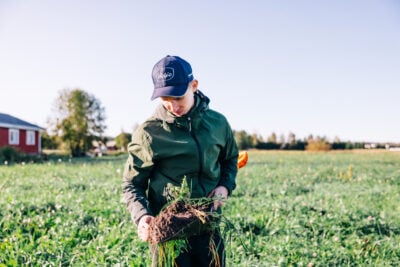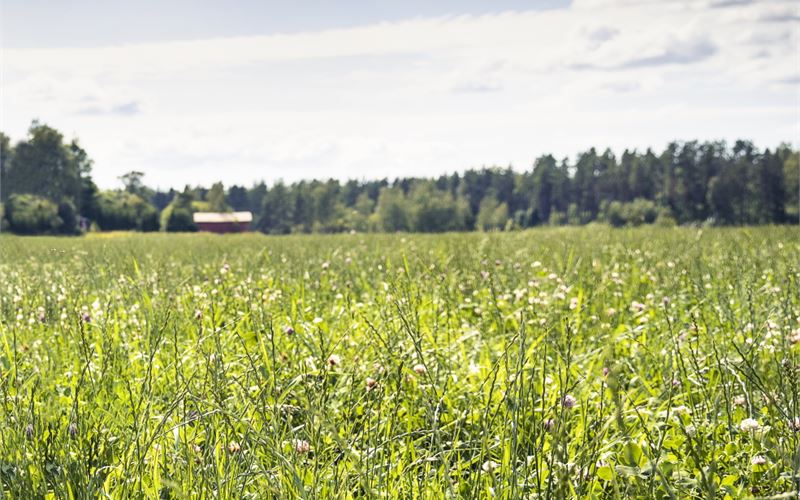Dairy farms can take climate action too

Biodiversity is dangerously declining. This can have serious and far-reaching impacts, some of which we don’t even know yet. Biodiversity and the future of milk production are weekly discussions at the Pelto-Mattila farm in Hausjärvi.
The birch leaves catch the mood of the summer breeze and the sun is shining so high above that it doesn’t cast a shadow. The smell of nature accents the warm air: all the summer flora in bloom and also the farm animals. Dairy farmers Katri Salovaara and Sami Suttinen of the Pelto-Mattila farm enjoy this peaceful Finnish landscape.
A Carbo survey of the biodiversity at the Pelto-Mattila farm was carried out in June 2020. The survey found that the pastureland where birch trees are growing today – and what used to be the old grazing area where the farm’s first cows used to graze more than a century ago – contain important plant species indicating biodiversity. Pastures along the edges of the Pelto-Mattila farm contain plants like Succisa pratensis, or devil’s-bit scabious, Silene viscaria, or sticky catchfly, and Lathyrus pratensis, or meadow vetchling, which attract pollinating insects.
“We monitor the pasture grass daily, and a lot of planning goes into grazing the cows in a way that is optimal both for the cows and the grass. The pastures have been divided into paddocks and then further into smaller sections where the cows are allowed to graze for up to 12 hours at a time so that the grass isn’t grazed too short. When grazed land is allowed to rest, nature regrows the vegetation and gives the cows fresh, high-quality nutrition,” explains Katri, who is finalising her master degree studies in agricultural science at the University of Helsinki.
While climate change and its impacts have been vigorously studied, we really don’t know what a loss of biodiversity ultimately means. Katri is especially pleased to see common starlings nesting at the farm near the grazing cows; the species declined sharply in Finland starting in the 1960s because of change in the habitat and environmental toxins in wintering areas. Now the population is on the rise again, and the grazing cows are an important partner for common starlings.
“Nature is amazing in the sense that when certain things are done on time and a positive spiral is created, the ecosystem starts strengthening itself on its own,” Katri says.


A Carbo biodiversity survey is performed with landscape experts trained in nature, biodiversity and traditional rural biotopes by listing plant, bird and insect species found in the habitat. After summer 2020, more than 50 surveys will have been conducted in collaboration with the Rural Women’s Advisory Organisation.

The Luoma farm explores ways to reduce emissions

Carbon footprint calculation becoming more accurate – soil e…

State-of-the-art instrumentation is analysing carbon sequest…

Our carbon footprint won’t reset overnight

Mr Juha Nousiainen

